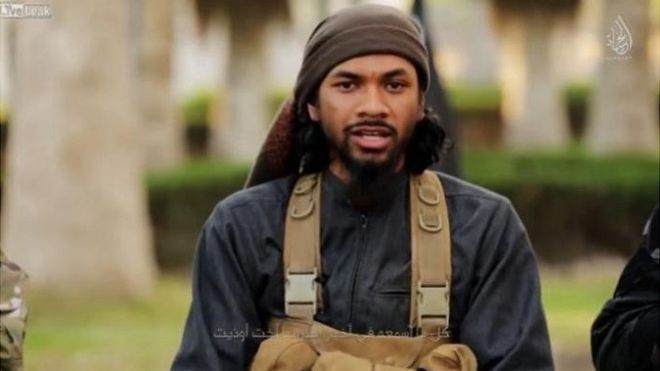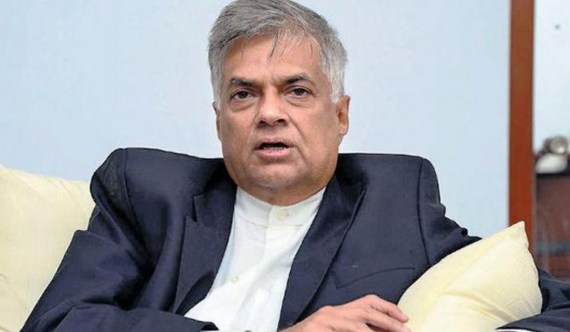By P.K.Balachandran
Colombo, April 26 (newsin.asia): Sri Lanka is to have a new law to book those who help conduct a terrorist act and also those individuals and institutions preaching terrorism, Prime Minister Ranil Wickremesinghe said in a statement here on Friday.
Wickremesinghe said that the reason for this is that terrorism is now an internationally inter-linked phenomenon and several countries affected by it have enacted laws to curb the menace and Sri Lanka has to follow suit as the April 21 Easter Sunday bombings have shown the international links of the group which carried out the carnage.
Investigations have revealed that the nine suicide bombers and the network that assisted them had links with the Islamic State operating from several countries overseas. “The bombings might have taken place in Sri Lanka but the remote control may be located in some country overseas,” the Prime Minister said.
Although only a minuscule number of people are involved in last Sunday’s act, many more may be involved peripherally but importantly. Even driving a van involved in a terrorist group or radicalizing people to the point of motivating them to indulge in terrorism should be criminalized. But the existing laws, even with enhanced Emergency powers, would not do. A specific law is the need of the hours, the Prime Minister said.
To quote him verbatim: “Sri Lanka has a very narrow definition of aiding terrorism. Therefore, we find that our existing laws are insufficient to deal with the extraordinary situation we are faced with. If we are to efficiently combat global terrorism, we have to broaden the scope of this old definition to allow us to arrest those aiding terrorism and confiscate their property. We also have to enact laws that deal severely with academic institutions that impart extremist religious views.”
“A number of clauses that deal with global terrorism were introduced into the Draft Counter-Terrorism Act. We further planned to add more such clauses at the amendment stage. But these new laws have not been passed by Parliament yet.”
Australian Police Knew A Bomber
A report in The Australian says that one of the suspected Lankan suicide bombers, had studied at a Melbourne university and had been investigated by the Australian security authorities after intelligence emerged linking him to Islamic State (IS) operative Neil Prakash, a young man of mixed Indo-Fijian and Cambodian extraction, born in Melbourne.
The Australian revealed that suicide bomber Abdul Lathief Jameel Mohamed, was investigated by the Joint Counter Terrorism Team in 2014. The investigation was triggered by intelligence that linked Mohamed to several counter-terrorism targets, including Prakash.
Prakash had converted from Buddhism to Islam in August 2012 after a visit to Cambodia, when he was repulsed by what he viewed as Buddhism’s commercialism and idolatry. He attended meetings at Al-Furqan bookstore and prayer Centre in Melbourne.
On 29 December 2018, the Australian government announced it had revoked Prakash’s Australian citizenship due to his links to terrorism.
One of Mohamed’s sisters, Samsul Hidaya, revealed how he had become “deeply religious” in Australia and returned to Sri Lanka a different man.
Trained in Kashmir
Another of Mohamed’s sisters, Fathima Zeenia, told police in a statement seen by The Australian, that he had completed a “course” in Indian Kashmir, a hotbed of Islamic radicalism and militant training.
Mohamed travelled to Syria and joined Islamic State before returning to Sri Lanka.
The Australian understands he had contact with Prakash, who at the time was at the height of his influence as an online radicalizer and facilitator for terrorist violence across the West, including Australia.
The full nature of that relationship is still being investigated but one source said that, at the very least, there was an “online’’ link between Mohamed and Prakash.
Earlier, Mohamed had studied at Melbourne’s Swinburne University from 2009-2013, where he completed postgraduate studies in technology.
His life in Australia was investigated by authorities once his links to Prakash and other counter-terrorism targets emerged, although the investigation produced no evidence suggesting he was a threat while in Australia.
Nor did evidence emerge that he had associated with Islamist extremists while in Melbourne. However, in light of the Easter attacks, the Sri Lanka bomber’s life in Australia is again under the microscope.
Australian Federal Police and ASIO are re-examining his relationships in Australia, particularly the possibility he had links to the small community of Islamic State radicals who ran riot in Melbourne in the early stages of the Syrian civil war.

Prakash In Turkish Custody
Prakash, who is in jail in Turkey, after he was caught fleeing Syria, left Melbourne in 2013.
There is no evidence Mohamed and Prakash knew each other while they were both in Melbourne. The Australian has been told it appears the pair communicated once Mohamed returned to Sri Lanka but before he travelled to Syria.
Before coming to Australia he studied aeronautics in Britain, prompting speculation he might have been one of the group’s bomb-makers.
Delayed Blast
After failing to set off his bomb at the intended target last Sunday, Mohamed detonated it close to the New Tropical Inn guesthouse in the Dehiwala district to the south of the city centre, killing two people.
His attack was the seventh of the day and caused the fewest fatalities.
The Australian Federal Police have flown officers to Sri Lanka to help authorities in what is now a major transnational investigation aimed at tracking down the bombers’ overseas links.
Eight out of the nine suicide bombers, including a pregnant mother of three, have been identified by police.
Most were well educated and all allegedly pledged allegiance to Islamic State.
Damage Amounts To US$ 1 To 1.5 Billion
According to Wickremesinghe the damage caused to the three hotels and the three churches and the Lankan economy at large is of the order of US$1 billion. But Finance Minister Mangala Samaraweera put it higher at US$ 1.5 billion.


























































